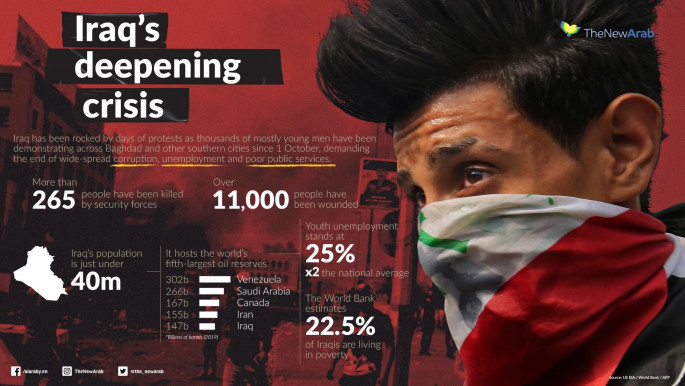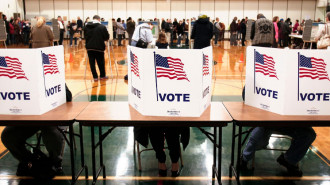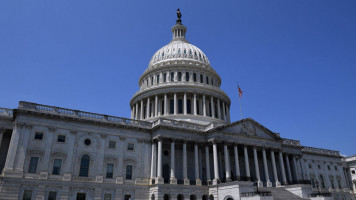Iraq forces retake key bridges from protesters amid increasing violence
They retook the Al-Sinek, Al-Shuhada and Al-Ahrar bridges over the River Tigris that link the east bank, where the main protest camps are located, with neighbourhoods on the west bank that are home to government offices and foreign embassies.
Amid volleys of tear gas, security forces chased demonstrators back onto Al-Rasheed Street, one of Baghdad's oldest and most celebrated thoroughfares.
Protesters still occupy part of Al-Jumhuriyah (Republic) Bridge, the southernmost of the capital's bridges and the closest to the main protest camp in Tahrir (Liberation) Square.
Over the past two weeks, demonstrators had spilt over from the square, first taking over part of Al-Jumhuriyah Bridge before creeping north onto the other three.
But the government ordered the security forces to keep them back, as Al-Jumhuriyah Bridge leads into the Green Zone where parliament and the British and US embassies are located.
Al-Sinek Bridge provides access to the embassy of Iran, a target for protesters who accuse Iraq's eastern neighbour of propping a government they regard as irredeemably corrupt.
Al-Ahrar (Free Men) and Al-Shuhada (Martyrs) bridges lead to the prime minister's office and state television headquarters.
Comment: Tuk-tuks of Tahrir: The unlikely symbol of a revolution in Iraq
Security forces have fired tear gas and both live and rubber bullets to keep the protesters back. They have even fired machine guns.
The sound of tear gas canisters and stun grenades reverberated around central Baghdad nightly over the past week.
Fired at point-blank range, the canisters have pierced protesters' skulls and chests, killing at least 16 of them, according to the United Nations.
Amnesty International said it has found the military-grade tear gas canisters were Serbian- or Iranian-made.
Baghdad has close but complicated ties with its eastern neighbour Iran, with whom it fought a deadly war in the 1980s but which now has significant political and economic sway in Iraq.
Many Iraqis protesting over the past month accuse Iran of being one of the primary sponsors of the corrupt, inefficient system they want to overthrow.
Powerful Iran-linked militias have also been accused of mounting attacks against demonstrators over the past few weeks.
Both the Iranian and Serbian models are modelled on military grenades and are up to 10 times as heavy as standard tear gas canisters used elsewhere, the human rights group said.
Standard tear gas munitions can already prove deadly if aimed directly at people, particularly if at the head, but such military-grade grenades are even more so, causing a spate of protester deaths and catastrophic injuries in Iraq.
Iraqi activists have accused the security services of aiming the grenades directly at the heads of protesters. Horrific footage depicting smoking grenades lodged in the heads of unconscious demonstrators has also been shared on social media.
"All the evidence points to Iraqi security forces deploying these military-grade grenades against protesters in Baghdad, apparently aiming for their heads or bodies at point-blank range," Lynn Maalouf, Amnesty's Middle East Research Director, said.
"This has had devastating results, in multiple cases piercing the victims' skulls, resulting in gruesome wounds and death after the grenades embed inside their heads."
Nearly 300 people have been killed in protest-related violence since demonstrations erupted on October 1 and swiftly spread from Baghdad to cities across the south, according to an AFP toll.
The government has stopped issuing updated tolls.
In a speech read out on his behalf on Friday in the Shia holy city of Najaf, Iraq's foremost Shia cleric, Grand Ayatollah Ali Sistani, praised protesters while holding Iraqi security forces responsible for their deaths. 
Follow us on Twitter and Instagram to stay connected!

![Palestinians mourned the victims of an Israeli strike on Deir al-Balah [Getty]](/sites/default/files/styles/image_684x385/public/2024-11/GettyImages-2182362043.jpg?h=199d8c1f&itok=xSHZFbmc)


![The law could be enforced against teachers without prior notice [Getty]](/sites/default/files/styles/image_684x385/public/2178740715.jpeg?h=a5f2f23a&itok=hnqrCS4x)
 Follow the Middle East's top stories in English at The New Arab on Google News
Follow the Middle East's top stories in English at The New Arab on Google News


